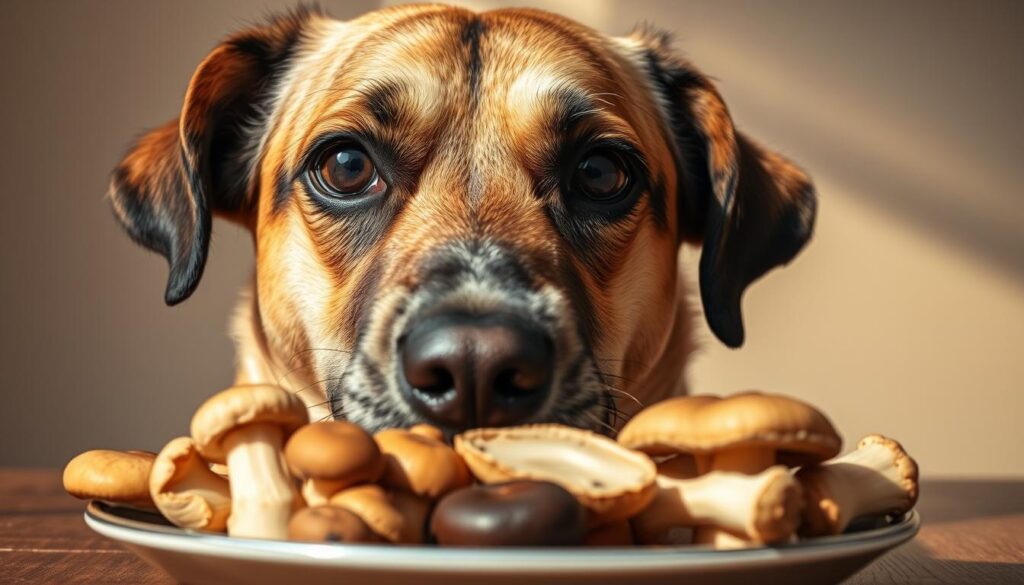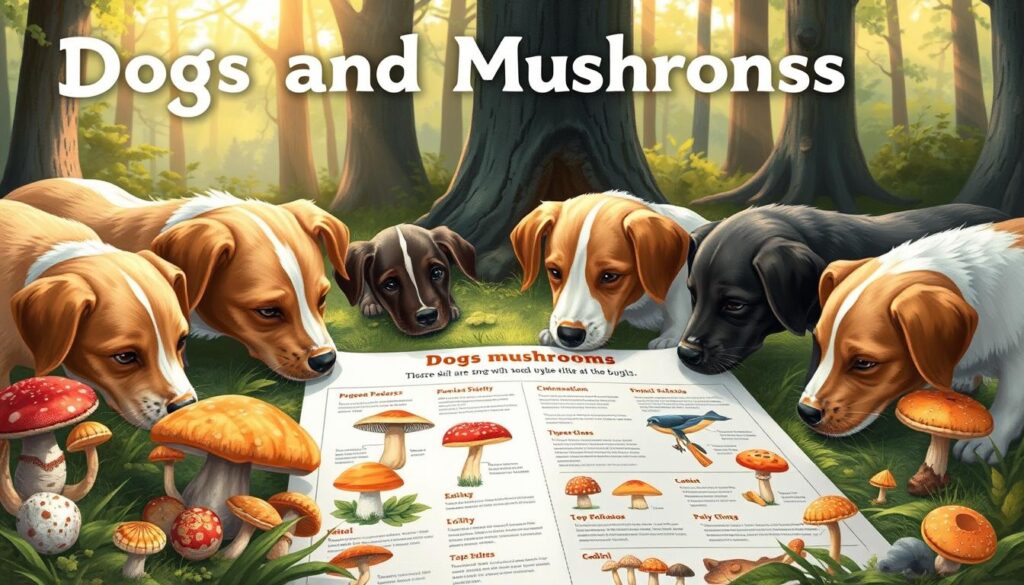Table of Contents
Can Dogs Have Mushrooms?
As a dog owner, I learned a hard lesson. Not all mushrooms are safe for dogs. My curious Labrador almost ate a wild mushroom one summer afternoon. This made me research if dogs can safely eat mushrooms.
Is it safe for dogs to eat mushrooms? The answer is not simple. Some mushrooms from the store can be good for dogs. But wild mushrooms can be very dangerous. This guide will help you understand the risks.
If you’re wondering if dogs can have mushrooms, you’re in the right place. You’ll learn how to keep your dog safe. Knowing which mushrooms are safe and which are not is key for pet care.
Key Takeaways
- Not all mushrooms are safe for dogs to consume
- Store-bought mushrooms are generally safer than wild varieties
- Consulting a veterinarian is crucial before introducing mushrooms
- Moderation is key when feeding mushrooms to dogs
- Wild mushrooms can be extremely toxic and should be avoided
Understanding Mushrooms and Their Types
Exploring mushrooms for dogs can be confusing. Not all fungi are safe for pets. It’s key to know the difference between safe and toxic mushrooms for your dog’s health.
Mushrooms come in many species, each with its own traits. Some can be good for your dog’s diet, while others are harmful.
Edible vs. Toxic Mushrooms
It’s vital to know which mushrooms are safe for dogs. Most store-bought mushrooms are safe:
- White button mushrooms
- Cremini mushrooms
- Portobello mushrooms
Common Mushrooms Safe for Dogs
Some mushrooms are good for dogs. Shiitake and oyster mushrooms are safe in small amounts.
Potentially Harmful Varieties
Wild mushrooms are risky. Some can be very dangerous or even deadly for dogs. The most dangerous include:
- Amanita phalloides (death cap)
- Inocybe species
- Galerina marginata
Always err on the side of caution when it comes to mushrooms around your dog.
While some mushrooms are good for dogs, the dangers of wild mushrooms are too great. Always check with a vet before adding new mushrooms to your dog’s diet.
Reasons to Consider Feeding Mushrooms to Your Dog
Dog owners might be interested in the health benefits of mushrooms for their pets. Some mushrooms can be good for dogs when given in small amounts. They are not a main part of a dog’s diet, but they can be helpful.
Knowing what mushrooms are good for dogs can help you decide if they’re right for your pet. It’s important to understand their nutritional value. This is especially true when thinking about giving mushrooms to puppies.
Nutritional Powerhouse for Canines
Mushrooms are full of nutrients that can help your dog stay healthy:
- Rich in Vitamin B complex for metabolic support
- Contains Vitamin D for bone and immune health
- Packed with antioxidants that combat cellular damage
- Low-calorie option for weight-conscious dogs
Health Benefits for Your Furry Friend
Some mushrooms can really help your dog’s health. They might:
- Boost immune system function
- Support cardiovascular health
- Potentially reduce inflammation
- Promote digestive wellness
Before giving mushrooms to your dog, talk to your vet first. Not all mushrooms are safe for dogs. Making sure they are prepared correctly is important for your dog’s health.
Signs of Mushroom Poisoning in Dogs
Dog owners need to watch out for mushroom poisoning. Some wild mushrooms are very dangerous for dogs. They can cause serious health problems that need quick help.
If a dog eats a mushroom by mistake, it might show some key symptoms. Knowing these symptoms can help your dog get better faster.
Identifying Critical Warning Signs
Mushroom poisoning in dogs shows through several warning signs:
- Sudden and persistent vomiting
- Uncontrolled diarrhea
- Severe abdominal pain and cramping
- Unusual weakness or lethargy
- Excessive drooling
- Yellowing of eyes or gums
- Seizures or neurological disturbances
Urgent Response Strategies
If you think your dog has mushroom poisoning, do these important things:
- Remove your dog from the mushroom area
- Collect a sample of the mushroom for identification
- Contact your veterinarian immediately
- Do not induce vomiting without professional guidance
- Monitor your dog’s breathing and consciousness
Getting your dog to a vet fast is key. Different mushroom toxins can harm different parts of the body. If not treated, it can lead to serious damage.
Quick recognition and professional medical response can dramatically improve your dog’s chances of recovery from mushroom poisoning.
How to Safely Introduce Mushrooms to Your Dog
Thinking about adding mushrooms to your dog’s diet? It’s a big step that needs careful thought and expert advice. Getting vet advice on mushrooms is key to keep your pet safe and healthy.

When wondering if dogs can eat mushrooms, it’s important to be careful and informed. Adding new foods to your dog’s diet should be done slowly and thoughtfully.
Consulting Your Veterinarian
Before giving mushrooms to your dog, talk to your vet. They can give advice tailored to your dog’s:
- Age
- Breed
- Health
- Diet needs
“Always seek professional guidance before making significant changes to your pet’s diet.” – Veterinary Nutrition Expert
Moderation is Key
Here are important tips for introducing mushrooms:
- Start with tiny portions
- Choose organic, store-bought mushrooms
- Avoid wild mushrooms completely
- Watch for any bad reactions
| Mushroom Type | Safe Serving Size | Frequency |
|---|---|---|
| White Button Mushrooms | 1-2 small pieces | Once a week |
| Shiitake Mushrooms | 1 small piece | Occasionally |
Remember, mushrooms should be an occasional treat, not a main part of their diet. Their main food should always be balanced, dog-friendly food.
Safe Preparation Methods for Mushrooms
Preparing mushrooms for dogs needs careful attention. Cooking and choosing the right mushrooms can make them a healthy treat. Knowing the best ways to prepare ensures your dog gets the most benefits without risks.
Cooking Methods for Dogs
Cooking mushrooms is key when feeding them to dogs. Raw mushrooms can be hard for dogs to digest. Here are some safe ways to prepare:
- Lightly steam store-bought mushrooms to preserve nutrients
- Boil mushrooms without added salt or seasonings
- Chop mushrooms into small, bite-sized pieces
- Cook thoroughly to eliminate potential bacteria
Seasoning and Ingredients to Avoid
Choosing the right mushrooms and avoiding harmful additives is crucial. Dog-friendly fungi should have minimal extra ingredients.
“The key to safe mushroom feeding is simplicity and caution.” – Veterinary Nutrition Experts
Ingredients to avoid in your dog’s mushrooms include:
- Garlic
- Onions
- Salt
- Butter
- Excessive oils
Pro tip: Always check with your vet before adding new foods to your dog’s diet, especially mushrooms.
Dog-Friendly Mushroom Varieties
Exploring edible mushrooms for dogs can be a fun and healthy journey for pet owners. It’s important to know which mushrooms are safe and good for dogs. Not all mushrooms are safe, but some can really help your dog’s health.
Choose mushrooms that are grown for dogs and are known to be safe and healthy. Always avoid wild mushrooms because they can be toxic.
Common Safe Mushroom Types
- White Button Mushrooms: Mild flavor and easy to digest
- Cremini Mushrooms: Slightly more robust nutritional profile
- Portobello Mushrooms: Rich in protein and minerals
- Shiitake Mushrooms: Packed with immune-boosting properties
- Porcini Mushrooms: Nutrient-dense option for dogs
Recommended Serving Guidelines
It’s important to control how much mushroom your dog eats. The right amount depends on your dog’s size and health:
- Small dogs (under 20 lbs): 1-2 small mushroom pieces
- Medium dogs (20-50 lbs): 2-3 small mushroom pieces
- Large dogs (over 50 lbs): 3-4 small mushroom pieces
“Always cook mushrooms thoroughly and serve them plain, without added seasonings or oils.”
Vets say to start with a little bit of cooked, plain mushroom. This helps your dog get used to it. Watch for any bad reactions and talk to your vet if you’re worried about mushrooms in your dog’s diet.
Risks Associated with Mushroom Consumption
When we talk about mushrooms and dogs, it’s important to know the risks. Some mushrooms are good for dogs, but not all. Toxic mushrooms can harm your dog’s health a lot.
Dogs can react differently to mushrooms. It’s key to know these risks for your dog’s health.
Potential Allergic Reactions
Some dogs might get allergic to mushrooms. Look out for these signs:
- Skin irritation or rashes
- Gastrointestinal distress
- Respiratory difficulties
- Unusual swelling
Long-Term Consumption Considerations
There’s not much research on mushrooms and dogs over time. Vets say to be careful with new foods.
Long-term worries might include:
- Digestive system adaptation
- Potential nutrient interactions
- Individual metabolic differences
Always consult with a veterinarian before making significant dietary changes for your dog.
Remember that individual dogs may react differently to mushrooms. Monitoring your pet’s response and seeking professional guidance is essential when exploring are mushrooms safe for dogs.
Alternatives to Mushrooms for Dogs
Looking for dog-friendly fungi and wondering if puppies can eat mushrooms? There are many nutritious alternatives to keep your furry friend healthy and happy. Not all dogs can handle mushrooms well. So, finding safe vegetable options is a great way to add variety and nutrition to their diet.

Vets suggest several vegetable alternatives that are as nutritious as mushrooms but safe for dogs.
Nutritious Vegetable Options for Dogs
- Carrots: Crunchy, low-calorie treats rich in beta-carotene
- Green beans: Packed with vitamins and minerals
- Sweet potatoes: High in fiber and essential nutrients
- Pumpkin: Supports digestive health
- Spinach: Provides iron and antioxidants
Safe Treats and Snacks
Always start with small amounts of new foods to avoid digestive problems. Can puppies eat mushrooms? While some are okay, these vegetable alternatives offer similar health benefits.
| Vegetable | Nutritional Benefit | Serving Size |
|---|---|---|
| Carrots | Vitamin A, Fiber | 1-2 baby carrots |
| Green Beans | Vitamin C, Low Calorie | 1/4 cup chopped |
| Sweet Potato | Vitamin B6, Potassium | Small cubed pieces |
Before changing your dog’s diet, always talk to your vet. Moderation and gradual introduction are key to ensuring your pet’s nutritional safety and enjoyment.
What to Do If Your Dog Eats Wild Mushrooms
Seeing your dog eat wild mushrooms can be scary. It’s a serious situation that needs quick action. Your fast response can help keep your dog safe.
If your dog eats wild mushrooms, stay calm and act fast. Not all mushrooms are bad, but some can be very harmful.
Initial Assessment Steps
- Identify the mushroom if possible without risking additional exposure
- Observe your dog’s immediate behavior and physical condition
- Look for signs of distress or unusual symptoms
- Collect a sample of the mushroom for veterinary identification
Critical Warning Signs
Watch for these signs of mushroom poisoning in dogs:
- Excessive drooling
- Vomiting or diarrhea
- Lethargy or weakness
- Abdominal pain
- Seizures or tremors
Veterinary Contact Protocol
Call your vet right away if you think your dog ate wild mushrooms. Tell them:
- When your dog ate the mushroom
- About the mushroom
- Your dog’s symptoms
- Your dog’s weight and health history
Remember, with wild mushrooms and dogs, seeing a vet is the best choice. Don’t wait to see if symptoms show up before getting help.
Popular Myths About Dogs and Mushrooms
Dog owners often get mixed messages about mushrooms and their safety. Knowing the truth can protect your pet from harm.
Many pet owners believe myths about mushrooms and dogs. These myths can harm your dog’s health. Let’s clear up some common misconceptions.
Debunking Common Misconceptions
- Myth: Dogs can naturally identify toxic mushrooms
Reality: Dogs can’t tell safe from poisonous mushrooms. Their instincts don’t keep them safe.
- Myth: All store-bought mushrooms are safe for dogs
Some mushrooms sold in stores can harm dogs. This includes mushrooms with garlic or onion seasonings.
- Myth: Wild mushrooms are only dangerous in certain regions
Toxic mushrooms are everywhere. They can seriously harm dogs, no matter where you are.
Facts You Should Know
Knowing the truth about mushrooms and dogs is important. While some mushrooms are good for dogs, many are not. Always check with a vet before giving mushrooms to your dog.
| Mushroom Type | Safety Status | Potential Risks |
|---|---|---|
| Wild Mushrooms | Extremely Dangerous | Potential toxicity, organ damage |
| Store-Bought Mushrooms | Conditionally Safe | Depends on preparation and ingredients |
| Medicinal Mushrooms | Potentially Beneficial | Requires veterinary consultation |
Always talk to a vet before adding new foods, like mushrooms, to your dog’s diet. Good research and vet advice can keep your dog safe.
Conclusion: Making Informed Choices for Your Dog
Choosing the right food for your dog is very important, especially when it comes to mushrooms. Vets say some mushrooms are okay, but they shouldn’t be the main part of your dog’s diet. It’s key to know about mushrooms to take good care of your pet.
Can dogs have mushrooms? It’s not a simple yes or no. Some mushrooms from the store might be okay in small amounts. But, wild mushrooms are very risky. Always think about your dog’s health first.
Be careful and don’t give too much of any mushroom. Not all mushrooms are safe, and the risks are too big. Stick to foods that are known to be good for dogs. Your vet can give you the best advice on what to feed your dog.
Keep your dog’s diet safe and balanced. Watch how they react to new foods. If they get sick or have allergies, stop giving them that food. Knowing about dog food is crucial for your dog’s health and happiness.
FAQ
Are all mushrooms toxic to dogs?
Not all mushrooms are bad for dogs. Some wild mushrooms can be very dangerous. But, store-bought mushrooms like white button, shiitake, and portobello are usually safe. Just make sure they are cooked right and given in small amounts.
It’s important to know which mushrooms are safe and which are not. Some wild mushrooms can make dogs very sick.
What symptoms should I watch for if my dog eats a wild mushroom?
If your dog eats a wild mushroom, look for signs like vomiting, diarrhea, and drooling. Also, watch for belly pain, feeling tired, yellow skin, or shaking. These could mean your dog has mushroom poisoning.
Call your vet right away. Quick action is key in treating mushroom poisoning.
How can I safely introduce mushrooms to my dog’s diet?
First, talk to your vet about adding mushrooms to your dog’s diet. Start with a little bit of plain, cooked mushroom. Watch your dog closely for any bad reactions.
Mushrooms should be a rare treat, not a big part of their diet. They should make up no more than 10% of what your dog eats each day.
Which mushrooms are considered safe for dogs?
Safe mushrooms for dogs include white button, shiitake, and portobello. They should be plain, cooked, and without any seasonings. Make sure to remove the stems and clean them well before giving them to your dog.
What should I do if my dog eats a wild mushroom?
If your dog eats a wild mushroom, stay calm but act fast. Don’t make them vomit unless your vet says it’s okay. Try to get a piece of the mushroom for your vet to look at.
Take a photo of the mushroom if you can. Then, call your vet or an animal poison control center right away. Tell them everything you know about the mushroom and your dog’s symptoms.
Can mushrooms provide health benefits for dogs?
Some mushrooms might help your dog’s health. They could boost their immune system, reduce inflammation, and have antioxidants. Mushrooms like shiitake and reishi might be good for them.
But, talk to your vet about this first. Mushrooms should not be the main part of your dog’s diet.
Are there any mushrooms I should absolutely avoid giving my dog?
Always avoid wild mushrooms, as many can be very toxic. Some mushrooms have amatoxins, which can harm your dog’s liver. If you’re not sure, don’t let your dog eat any mushrooms they find outside.
How should mushrooms be prepared for dogs?
Mushrooms for dogs should be lightly cooked, like steaming or boiling. Don’t add oils, salt, or seasonings. Remove the stems and clean them well. Serve them in small pieces and introduce them slowly.
Cooking mushrooms is better because raw ones can be hard for dogs to digest.
There are no reviews yet. Be the first one to write one.

